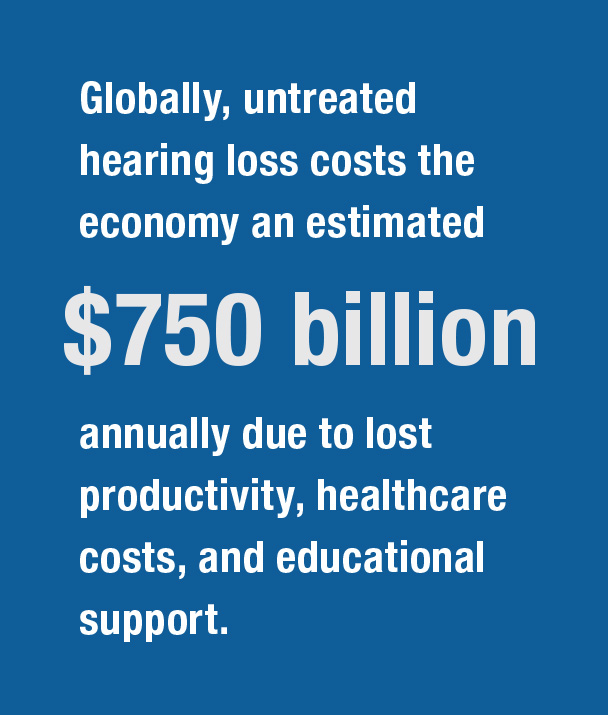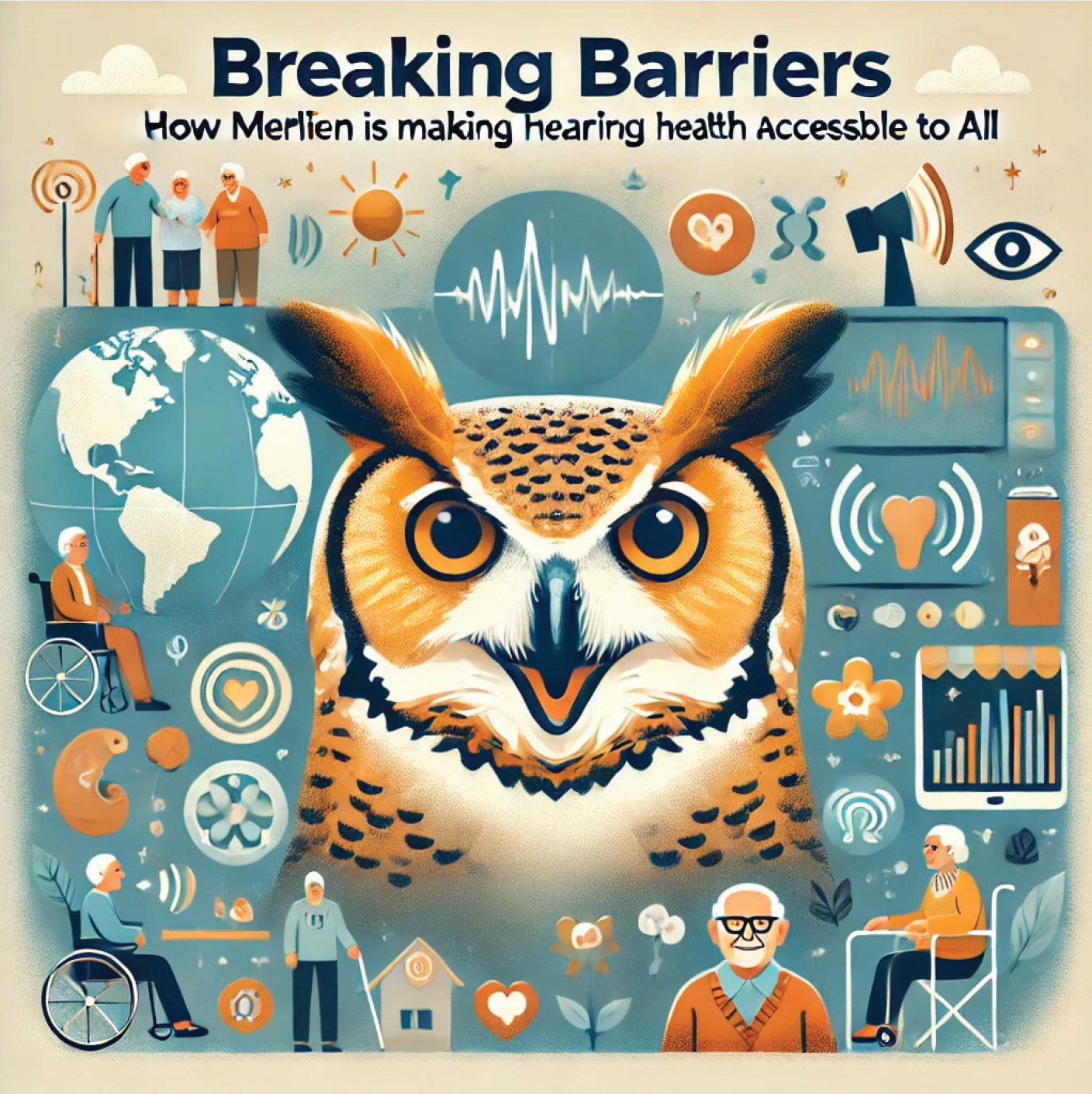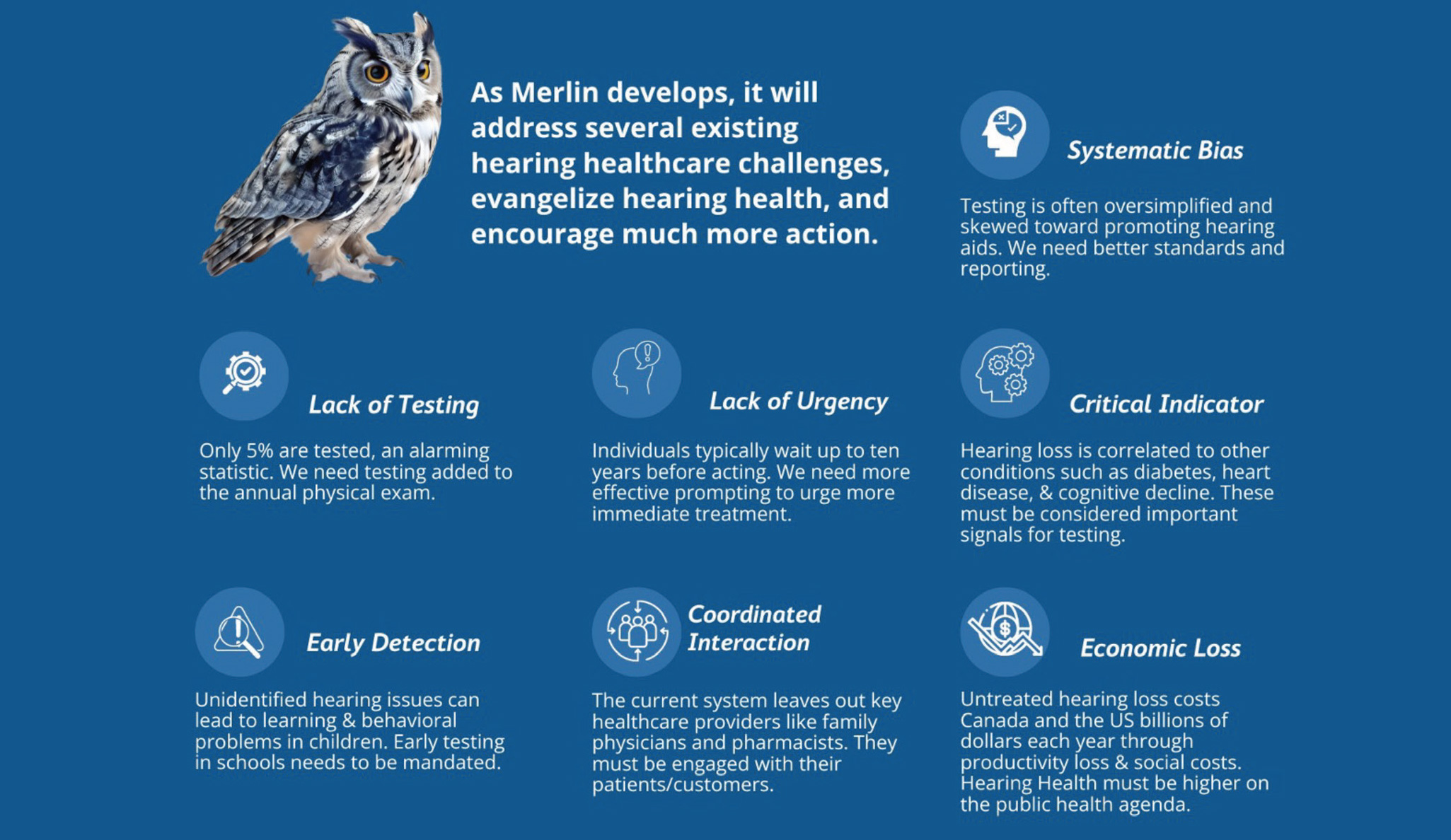
Introducing Merlin Making Hearing Care Accessible to All
Terry Mactaggart
Hearing health is a critical issue that affects millions of people worldwide, yet it is often overlooked—especially among vulnerable populations like the elderly, low-income communities, and those living in remote areas.
According to the World Health Organization (WHO), over 80% of people with disabling hearing loss live in low- and middleincome countries, where access to hearing care is severely limited. Even in high-income countries, many people face challenges in accessing hearing health services due to financial constraints, lack of awareness, and geographical barriers.
The Global Challenge of Hearing Health
 Hearing loss isn’t just a personal issue—it has far-reaching social and economic impacts. Untreated hearing loss can lead to social isolation, reduced quality of life, and a decline in mental and cognitive health. Globally, untreated hearing loss costs the economy an estimated $750 billion annually due to lost productivity, healthcare costs, and educational support. These figures highlight the urgent need for accessible hearing care, yet the reality is that many people simply do not have the resources or access to necessary services.
Hearing loss isn’t just a personal issue—it has far-reaching social and economic impacts. Untreated hearing loss can lead to social isolation, reduced quality of life, and a decline in mental and cognitive health. Globally, untreated hearing loss costs the economy an estimated $750 billion annually due to lost productivity, healthcare costs, and educational support. These figures highlight the urgent need for accessible hearing care, yet the reality is that many people simply do not have the resources or access to necessary services.
In low- and middle-income countries, the situation is even more dire. The WHO reports that in these regions, there is often only one audiologist per million people. This scarcity of resources means that many people with hearing loss never receive the care they need, leading to avoidable disability and suffering. Even in wealthier nations, barriers such as high costs, limited availability of specialists, and lack of awareness prevent people from seeking timely treatment.
How Merlin Is Changing the Landscape
Merlin is designed to break down these barriers and make hearing health accessible to everyone, regardless of their circumstances. With Merlin, hearing care is no longer a luxury but a service available to all. The platform leverages cutting-edge AI technology to offer personalized, actionable insights that empower users to take control of their hearing health from anywhere in the world.

Accessible Technology for All
Merlin’s user-friendly interface makes it easy for anyone to monitor their hearing health, even without prior technical knowledge or expensive equipment. The platform’s hearing tests are simple and non-invasive, allowing users to assess their hearing at home with nothing more than a smartphone or computer. This ease of access is particularly valuable for elderly individuals or those in remote areas who might otherwise struggle to access traditional hearing health services.
Personalized, Actionable Guidance
Merlin doesn’t just provide hearing tests; it offers personalized recommendations tailored to the user’s specific needs. For instance, an elderly person living in a rural area with limited access to healthcare might not know where to turn if they experience hearing loss.
Merlin can guide them through the next steps—whether it’s exploring affordable hearing aid options, seeking further medical evaluation, or making lifestyle changes to protect their hearing. This personalized approach ensures that users receive care that is appropriate for their individual circumstances, reducing the risk of untreated hearing loss and its associated complications.
Culturally Sensitive and Multilingual
Merlin’s commitment to accessibility goes beyond technology. The platform is designed to be culturally sensitive and available in multiple languages, ensuring that users from diverse backgrounds can benefit from its services. Whether someone speaks English, Spanish, Mandarin, or another language, Merlin is there to guide them through their hearing health journey in a way that is respectful and understandable. This cultural inclusivity helps break down additional barriers to care, making Merlin a truly global solution.
Your Role in Expanding Merlin’s Reach
Imagine a world where everyone, regardless of their location, income level, or background, has access to the hearing care they need. With Merlin, that world is within reach. Your contribution can help us develop new features, enhance our multilingual support, and ensure that even the most remote and underserved populations can benefit from Merlin’s life-changing capabilities.
My recent post about “Moving the Meter for Hearing Health” summarized a perspective gained over the last decade as the hearing health market evolved. That, for me, started with an article published in Audiology Practices (Winter, 2013) where, as a business professional and hearing tech company founder, I noted that concentrated industry structure and bundled trade practices would inevitably lead to disruption and the introduction of new hearing care models. Several posts followed about “Navigating the Road Ahead” concluding with those during the last couple of years when “Disruptions” were described as becoming more obvious.
 A complimentary insight stemmed from the substantial data set we have accumulated from testing in several different settings (family physicians, hearing aid dispensaries, pharmacies, public spaces) covering a wide demographic from young children to Super Seniors. Given our ability to interpret pure tone results and place them in standard audiological categories, we were able to determine the proportion of users in various age cohorts who classified as Normal, Conductive, Sensorineural, and Mixed.
A complimentary insight stemmed from the substantial data set we have accumulated from testing in several different settings (family physicians, hearing aid dispensaries, pharmacies, public spaces) covering a wide demographic from young children to Super Seniors. Given our ability to interpret pure tone results and place them in standard audiological categories, we were able to determine the proportion of users in various age cohorts who classified as Normal, Conductive, Sensorineural, and Mixed.
A third stimulus continues to come from the research community – numerous studies and articles stressing the growing incidence of hearing problems, comorbidities with other disease states and relationships to cognitive concerns.
This combination of influences has led me (corroborated by others) to conclude that Hearing Loss is arguably the largest untreated chronic health problem in our society and that current approaches, several innovative and progressive, are not doing enough to stem the still rising tide.
The traditional market approach has long been limited in scope. While identifying hearing loss and prescribing hearing aids are essential components of hearing health, they are only pieces of a much larger puzzle. Many aspects of an individual’s hearing health, except when examined carefully by a skilled professional, go unaddressed, leaving gaps in care that can impact overall well-being. This is particularly true of internet-based testing.
Critical factors that are frequently overlooked include:
- Age and Messaging: Position in one’s life cycle is an obvious consideration. While the proportions of so-called “Normals” are higher at younger ages and “Sensorineurals” increase with older people, most virtual testing doesn’t account for the age factor. And clearly the messages provided as motivators to different age cohorts with similar classifications need to be different and nuanced.
- Lifestyle Considerations: One’s daily activities, hobbies, and work environment all play a significant role in hearing health. Standard tests rarely account for these differences, leading to one-size-fits-all solutions.
- Overall Health: Conditions such as diabetes, cardiovascular disease, and even stress can influence hearing health significantly. These factors are often ignored particularly in net-based hearing assessments, yet they are crucial for understanding the full picture of auditory well-being
- Personal Preferences: The decision to use hearing aids or other interventions is deeply personal. Factors such as comfort, aesthetics, and lifestyle compatibility should be considered, but they are often sidelined in the rush to fit a device.
This narrow approach can result in missed opportunities for early intervention, underutilization of preventive measures, and suboptimal care that fails to address the unique needs of each individual.
Bridging those gaps by offering a more holistic and personalized approach to hearing care will contribute to redefining how we think about and manage hearing health. Rather than waiting longer, we have decided at Summus to embark on an ambitious project which, when fully available, should help “Move the Meter” in a significant way. It is being branded “Merlin” and represent a major, potentially breakthrough, addition to our well-established Hearing Guidance Process.
An introductory description reads…

And is amplified by the hearing healthcare problems it is designed to address…

Our hope is, that with sufficient backing, an “AI Companion” like Merlin - a capability still scarce but likely to see more in healthcare - will become conventional in use.
Breaking down silos to foster greater collaboration, mandating doctors to add hearing to their protocols, new applications of AI and more robust, well funded policy initiatives would also make a positive difference. My wish, over time, is that that the hearing ecosystem will mature to approximate what has been achieved in other disease arenas. And that’s a Big Wish! ■
Terry Mactaggart is founder and CEO of Summus, the Hearing Guidance Company. Inquires can be forwarded to him at terry.
